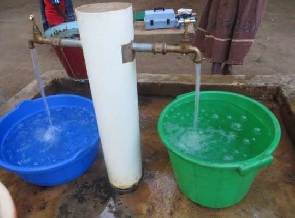"A community scorecard assessing the performance of service providers in revenue mobilization and utilization has given the Ghana Water Company Limited a score of 34.16%.
Citizens from the Tamale and Sagnarigu Municipalities generated the scorecard, basing their assessment on issues such as inadequate water supply to residents, inappropriate water billing, the quality of water supply, and poor customer service, among others.
This information was disclosed at a consultative forum held in Tamale, aimed at producing data that would empower citizens and civil society organizations to legitimately engage local governments for improved social service delivery, particularly for pro-poor services.
The forum, organized by Norsaac, an NGO, in collaboration with the Media Foundation for West Africa (MFWA) and EDUWATCH, and funded by Oxfam in Ghana, was part of the implementation of a two-year project titled 'Strengthening Advocacy on Inclusive Democracy in Ghana (SAID-Ghana)'.
It convened stakeholders, including chiefs, youth groups, market women associations, hoteliers' associations, and labor unions, for comprehensive training on using community scorecards. This training aims to enhance the transparency and accountability of duty-bearers in the two assemblies.
The assessment considered three thematic areas: water supply, electricity, and the mobilization and utilization of revenues at the assemblies.
The scorecard also rated the Northern Electricity Distribution Company (NEDCo) at 39%, reflecting issues such as interrupted power supply, illegal connections, challenges in billing processes, and poor customer service.
The assemblies received a score of 48.44% for revenue mobilization and utilization.
Mr. James Nachibu, Programme Manager at Norsaac, stated during the event in Tamale that the exercise was designed to improve transparency and accountability from duty-bearers, thereby enhancing social service delivery for the citizenry.
He mentioned that the outcomes of the scores would form the foundation for citizen-local government engagements through sector reviews and annual performance reviews, among other activities.
Dr. Kojo Impraim, Director of Research and Advocacy at MFWA, emphasized that citizens should exhibit greater patriotism by presenting empirical data on issues that affect them, thereby drawing the attention of the government and other stakeholders to their challenges.
Alhaji Mohammed Seidu, Vice Chairman of the Livestock Farmers Association in the Tamale Metropolis, expressed concerns over the poor delivery and access to social services, particularly water supply, noting its adverse impact on their businesses.
He expressed optimism that the service providers, following the interface meeting, would implement measures to enhance their services for sustainable development."
Regional News of Wednesday, 1 May 2024
Source: GNA

















